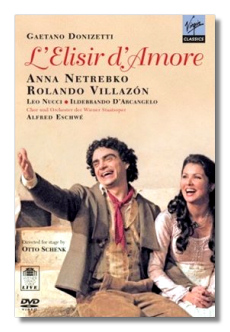
The Internet's Premier Classical Music Source
Related Links
- Donizetti Reviews
- Latest Reviews
- More Reviews
-
By Composer
-
Collections
DVD & Blu-ray
Books
Concert Reviews
Articles/Interviews
Software
Audio
Search Amazon
Recommended Links
Site News
 DVD Review
DVD Review
Gaetano Donizetti

L'Elisir d'Amore
- Rolando Villazón (Nemorino)
- Anna Netrebko (Adina)
- Leo Nucci (Belcore)
- Ildebrando D'Arcangelo (Dulcamara)
Vienna State Opera Orchestra & Chorus/Alfred Eschwé
Virgin Classics DVD 363352-9 130min LPCM Stereo Dolby Digital DTS Anamorphic Widescreen
I don't know what else was playing in Vienna in April 2005 – maybe there was an Austrian production of Les Miz, or perhaps Cirque de Soleil. In any event, I wager that this production of L'Elisir d'Amore still was the best show in town. This opera's tunefulness and fun are not far removed from the best of Broadway, especially when it is performed as it is presented here.
No doubt this revival was intended primarily as a joint showcase for Villazón and Netrebko, who have appeared together in a number of productions. Both are young, attractive, personable, and gifted with first-class voices. (Although they are not married, think of them as the Alagna and Gheorghiu of the current decade.) Watching this, it is hard not to fall in love with them. Villazón's voice most closely resembles that of Plácido Domingo… not the present-day Domingo, but the tenor who wowed the world in the 1960s and 70s. The sound is golden, and Villazón (like Domingo) has both power and grace. His "Una furtiva lagrima," although at times it is oversung, is a lesson in legato and in bel canto goodness. In this role, he comes across as part Dudley Moore and part Harpo Marx. He's quite an adept comic actor, and he can juggle apples too! As with the singing, sometimes less would have been more, though. For example, Nemorino's Act Two duet with Belcore is not meant to be funny, but Villazón (or at least stage director Otto Schenk) would have us think otherwise. This is just a small blot on what is otherwise an endearing performance.
By any standard, Netrebko is a beautiful woman, and also a good actress. Clearly, she is having the time of her life on the stage of the Wiener Staatsoper. Musically, Adina doesn't present her with anything that she can't handle with ease. High notes are clear and true, and although she is more convincing as a lyric soprano than as a coloratura, she does herself no dishonor in her opening aria, nor in her ultimate reconciliation with Nemorino. Of the two singers, however, it is Villazón who has the more distinctive voice, and the more secure technique.
Nucci is a veteran who has sung most of the great baritone roles. He turned 63 in April 2005. Not only is he old enough to be Netrebko's father (rather than her potential husband), the florid passages are sung stiffly, and the voice is harder and drier than it was in the 1980s. One salutes Nucci for his longevity and drive (he's a sprightly Belcore for sure), but this is not a good role for him now. On the other hand, D'Arcangelo's Dulcamara is younger and more handsome than we usually see (and hear), a not very convincingly greyed wig notwithstanding. His voice sounds smaller and lighter here than on other occasions. Nevertheless, he makes Donizetti's tongue-twisting writing sound easy, and he also is a graceful comedian.
The orchestra plays well for Eschwé, and the chorus, apart from a shrill soprano or two, is in good form. I don't recall hearing timpani in Elisir before, though, and so I was a little bemused by their presence. (A different edition perhaps?) Eschwé moves the performance along without exaggeration or undue haste. The sets and costumes are from 1980, and don't look ready for retirement yet.
Although, the cameramen keep a close eye on the principal singers, we don't lose the feeling of being present at an actual performance. The widescreen image is warm and clear, and so is the sound, which is in the three usual formats. The English subtitles are expertly done, even though at one point they lapse into "Dottore!" when elsewhere it was just "Doctor."
This is a loveable opera, and this DVD is an excellent excuse for falling in love with it all over again.
Copyright © 2007, Raymond Tuttle




















